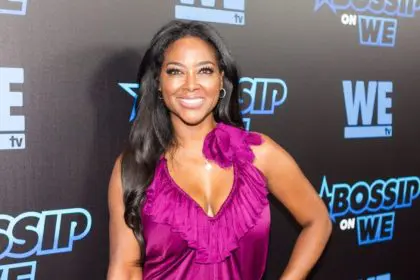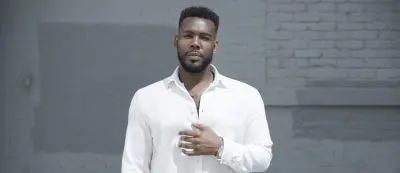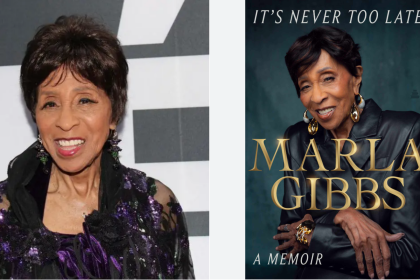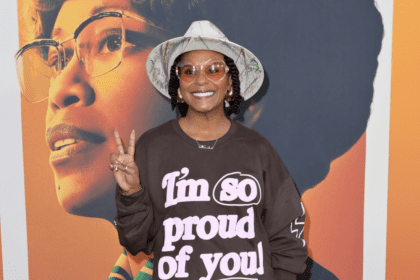
Since childhood, writing has always been a therapeutic outlet for Holly Charles. Whether writing music, poetry or prose, the power of language has always intrigued her and served as a way to examine parts of herself and express her innermost thoughts.
After a brief career in television production, the graduate of Prairie View A&M University’s English master’s program found her true calling in the wonderful world of teaching. Her new career path provided opportunities for her to research and teach literature concerning the often overlooked and understated African American experience. It was an unusual thesis option given to her to obtain her master’s degree that would change the course of her life and ultimately bring about her debut novel, Velvet, which gives an in-depth look at the effects of attitudes and ideas passed down through generations of African American women.
When she’s not traveling the country hosting literary talks and symposiums, the in-demand public speaker teaches English to 9th and 11th graders at JV High School in Jersey Village, Texas.
Rolling out recently sat down with Charles to discuss her love for teaching, how her book Velvet began as a grad school thesis, and how some of the issues of Black people are handed down through generations.
Did you always know teaching would be in your future?
Actually, I didn’t. I began my career in television production, hoping I could join a production and writing team, dream beautiful scripts and watch them manifest on the big screen. I started off like most aspiring TV producers and writers as a production assistant. I thought I had found my passion but it wasn’t until the television show I worked for at the time (“The Judge Mathis Show”) went on its hiatus that I actually found my purpose. I found that purpose trumps passion any day. I subbed in an alternative school just to make a few extra dollars and walked away with the leprechaun’s entire pot of gold. Being an alternative school of about 75 students dealing with everything from depression, to abandonment, to imprisonment, sexual abuse, drug addiction, etc., the administration paid close attention to the students’ reactions to subs. In my case, the students had such a positive reaction to me that they decided to keep me on as a floating sub instead of constantly introducing these already fragile kids to new and temporary staff. I stayed in the building 2 weeks straight, and that was all it took for me to know that teaching was my absolute purpose. Now, I’ve been in the classroom 11 years.
Describe the joy and satisfaction you find in teaching.
Remember watching cartoons as a kid and your favorite character would get a bright idea and that light bulb would “ding” and appear above their heads? Figuratively speaking, I get to see that happen every day. And, I know in some small way, I’m sending them forth with a resource, a conversation at the dinner table with their parents, a skill that gets them their dream job or a piece of wisdom that they may not remember coming from me but that they can still pass on to others. It’s a beautiful thing to actively help people grow. As an English teacher, I get the chance to not only teach grammar and writing techniques, but I am blessed to help students discover literature and see themselves in characters. I get to teach life skills. I have the honor of not simply asking them for the right answer but allowing them to define the answer. I get to use music in class as modern-day poetry and trick them into listening to classics by Nina Simone, 2Pac, Billie Holiday and Common all in one class period. My goal is to teach more than what’s on the page and send them out with more than a diploma. It’s a great responsibility. It’s a greater honor.
What do you think are some of the misconceptions that older generations have about the kids of today?
I think older generations underestimate what kids can handle and how insightful they can be. We have to make kids feel confident by giving worth to their ideas. They look to us for affirmation but, oftentimes, they’re met with condescension.
What’s your best advice for those looking to become teachers in the future?
Substitute or volunteer first! Teaching isn’t about you loving kids. It’s not even about you loving your content. It’s about how you react to the students and how they react to you. The most knowledgeable people make awful teachers sometimes. And, the most kind-spirited people sometimes realize they can’t handle a bevy of students. You absolutely should test drive this career first.
Talk about your journey in conceiving Velvet, from idea to publication.
Going into my last semester of grad school at Prairie View A&M, I was given the option to either read a long list of books and test over them or write a thesis. Honestly neither option thrilled me. I had read so many novels, journals, critiques, theories, plays, etc. and didn’t want to focus on someone else’s work anymore. Then I was told about a creative thesis option where I could write an original piece and apply it for a completed thesis. My wheels turned and churned and I decided to write about what was important to me – my family. In particular, I started thinking about my mother’s words, saying, “If you ever get a chance, you should write about your grandmother’s life. Now, that would be a good book!”
Was writing a book ever in your plans?
Secretly, I’d always wanted to write a book but I never wanted my confidence to exceed my talent. Quite frankly I was afraid, but this creative thesis option gave me the opportunity to write the book and call it “homework”. To my surprise the professors who attended my defense panel insisted that I publish my thesis as a book.Their confirmation pushed me to move forward. After deciding to self-publish, I threw a publishing party and fundraiser where I invited 30-40 women of color to listen to excerpts. In between excerpts, the women were prompted with questions and we had relevant dialogue about all that the book tackles (colorism, self-esteem, evolving views of womanhood, motherhood and marriage, sibling rivalry, generational curses). An event that should have lasted 1 1/2 hours turned into 4 hours of women releasing feelings they’d never explored.
How did that moment of all those women opening up like that make you feel?
I looked around a room full of sobbing women and realized that Velvet was so much bigger than me publishing a book. Velvet was a ministry of sorts. Besides my calling to teach, I had never before felt so sure of something. Every time I facilitate a literary talk, answer callers on a radio show or sit on a panel, I encounter women of color who say, “I never had the opportunity to talk about how I felt. I never felt justified in admitting to some of the pain associated to being both female and Black.” I like to give these women an opportunity to say out loud that they’re hurt. I developed the concept of Common Tragedies. The term almost seems like a paradox because for most people, we believe that if it happens every day, if it’s common, we don’t have the right to complain. But no matter how commonplace the injustice, it is still tragic. We still deserve the chance to grieve, and on the other side of it, be redeemed. Velvet is full of stories that are common for Black women but it humanizes our experiences. And it allows for us to admit that we’ve been hurt.
How did the idea for Velvet come about?
After stripping away the theoretical analysis and shortening the book’s title from Velvet: The Burden of Melanin and Motherhood to simply Velvet, I was left with a series of vignettes chronicling the lives of women from the early 1900s up to present day. Each story is linked, as the women share the same lineage and consequently some of the same generational curses. As I wrote Velvet and learned about my family’s history from my 80 year old grandmother, I saw a common link between the mothers and daughters. In trying to protect their daughters, they’d sometimes pass down fear and experiences which hurt them. Velvet shares bleak moments of misunderstanding and shining moments of realization between generations.
In what ways do you think some of the issues and themes (such as colorism) still affect African-Americans today?
While we hate to admit it, Black women are still basing our standards of beauty and worth on mentalities handed to us from forgotten slave owners. We are still shading our daughters from the sun and teaching them which tier of the pyramid they belong to based on the lengths of their ponytails. And, we can’t blame Mama. She received these jewels of knowledge from her Mama and so on. But, this self-hate, ultimately did not originate with us. It’s simply perpetuated and continued through us. Reading books like Velvet and having candid talks about our experiences helps us to recognize and stop the cycle.
What are your three most favorite books?
Their Eyes Were Watching God by Zora Neale Hurston; Americanah by Chimamanda Ngozi Adichie and The Coldest Winter Ever by Sister Souljah.
Any advice or words of wisdom for aspiring authors?
Write when the ideas come to you. I don’t care if it’s on restaurant napkins, the inside of your wrist or the back of a speeding ticket. You can’t afford to lose your train of thought.
Any favorite quotes or affirmations?
“Anything that’s not growing is dead.” And this one that I share on the back of my book…probably stolen from my theoretical analysis “Mothers do not seek to destroy their daughters any more than daughters seek to disappoint them; yet our own personal experiences shape the actions that lead to such perfidious results.”
What’s next for Holly Charles?
Since publishing Velvet, I have found a niche in speaking with women of color via literary talks, radio interviews and panel discussions. My goal is to continue drawing attention to some of the issues plaguing Black female lineages. I’ve also been asked when my next book is coming. It’s definitely gonna be after I’ve exhausted most avenues for promoting Velvet. The writing bug is gnawing away at me, though, so it shouldn’t be very long.
Velvet is available at Amazon, Barnes & Noble and other book outlets.
For more information on Holly Charles and her novel Velvet, please visit www.velvetthenovel.wix.com/velvet


















